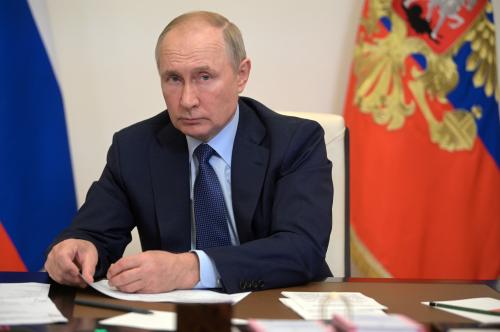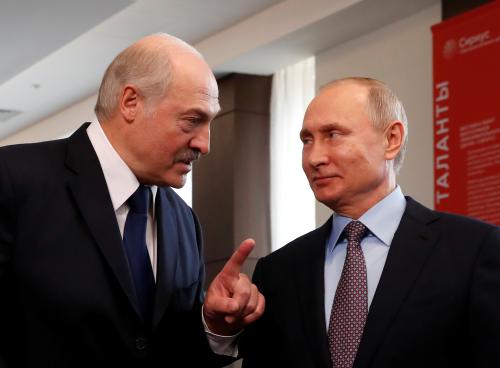Europe currently faces several crises exploited or instigated by Russia. Speculation runs rampant regarding what Vladimir Putin hopes to achieve. Steven Pifer argues that he should take care not to overplay his hand. This article was originally published with the Center for International Security and Cooperation.
Europe currently faces several crises exploited or instigated by Russia. Speculation runs rampant regarding what Vladimir Putin hopes to achieve. He should take care not to overplay his hand.
One crisis came to a head over the past two months as the cost of natural gas in Europe skyrocketed. While down from peaks in October, the price now hovers at about four times what it was at the beginning of the year. Russia did not cause this crisis — its roots lie in factors such as abnormally high energy demand and reduced gas production in Europe — but Moscow certainly has exploited the situation.
The Kremlin maintains that gas sales to Europe are “a purely commercial issue.” One would expect, however, that Russia’s Gazprom would eagerly increase gas exports, attracted by the dramatically increased prices. But gas flows remain significantly below what they could be. In October, Deputy Prime Minister Alexander Novak suggested that gas flows could increase if the Nord Stream 2 pipeline that runs under the Baltic Sea from Russia to Germany began operation. That overlooks the fact that Russia already has plenty of pipeline capacity to move additional gas to Europe … if it wanted to do so.
Belarusian strongman Alexander Lukashenko manufactured the second crisis, playing out along the border with Poland. Belarus has attempted to force migrants and economic refugees from the Middle East into Poland. Lukashenko is unhappy that the European Union does not recognize him as president and has applied sanctions as Minsk cracked down on domestic opposition, including forcing down a civilian airliner to arrest one of the passengers in May.
This despicable weaponization of migrants is likely Lukashenko’s brainchild. Moscow has nevertheless aligned itself with Minsk. When Poland reinforced its border police with regular army soldiers, the Russian air force flew nuclear-capable bombers over Belarus in response.
The third crisis stems directly from Moscow having positioned military forces near Ukraine’s borders, raising questions about a possible Russian assault. The Russian military carried out a similar build-up last spring, though nothing came of it. However, relations between Kyiv and Moscow have only worsened. In July, Putin published a 6,000-word essay that all but denied Ukraine’s right to exist as an independent state. In October, former President Dmitry Medvedev asserted that it was “pointless” to negotiate with Kyiv.
While Moscow denies ill intent, in recent days Secretary of State Antony Blinken and NATO Secretary General Jens Stoltenberg have publicly cautioned Russia about using force against Ukraine. French President Emmanuel Macron stated that France was ready “to defend the territorial integrity of Ukraine,” and Britain prepared to send 600 troops to the country.
This all plays out as the Kremlin tightens the repressive screws at home. The Russian Prosecutor General’s Office moved last week to close down the Memorial Human Rights Center. The best-known human rights entity in Russia, it was established and allowed to operate in Soviet times.
These crises all put pressure on Europe and the West, as they no doubt were intended to. But Putin and the Kremlin in each case run the real risk of miscalculating and overplaying their hand.
When an earlier surge of migrants swept into Europe beginning in 2015, EU member states divided over what to do. Germany heroically accepted one million, while Poland resettled virtually none, and its ruling party’s leader blamed Berlin for the influx. This time, EU members are of a single mind. The German government offered to send German border guards and place them under Polish command to manage the situation on the border with Belarus. The European Union has begun preparing a list of new sanctions to apply against Minsk. The greater their impact, the more that Lukashenko will turn to Moscow for financial assistance — something that should hold little appeal for Putin.
Russia over the past 30 years has a history of using the energy weapon against post-Soviet states, such as Ukraine and Georgia, and others in what was once termed “eastern Europe.” Moscow sought, however, to maintain a reputation as a reliable energy supplier to countries such as Germany, Austria, Italy and the Netherlands. The current situation puts that reputation in doubt, and European capitals may have begun to realize the vulnerability created by dependence on Russian energy. In Germany, where the eco-friendly Greens party will enter the new government, it could spur a faster transition away from carbon energy. As Putin well knows, oil and gas are Russia’s two most lucrative exports. Is it in Russia’s interest to encourage Europe to intensify its search for alternative sources and accelerate its move away from carbon energy?
As for Ukraine, a Russian military attack would trigger a string of costs. U.S. and European officials have already begun to develop a list of possible new sanctions against Moscow. Following Putin’s summit with President Joe Biden, several U.S.-Russian communications channels were restored, and both sides reported constructive exchanges in their strategic stability dialogue. Nothing would kill those small positive steps more quickly than a Russian attack. The largest potential cost for Moscow looms in Ukraine; its military is greatly improved and, while it might not be able to defeat a Russian incursion, it would make the invaders pay a heavy price. More sanctions, a deep freeze with Washington and the West, and Russian soldiers coming home in body bags hardly seem in Moscow’s interest.
Each of these crises could develop in ways inimical to Russia’s — and Putin’s — interest, at least as those interests are perceived from the West. Putin, however, does not follow Western logic. As noted in a recent article, he does not always make decisions rationally and sometimes tends to act emotionally, especially when it comes to Ukraine. (Indeed, Kremlin aggression the past seven years has done more than anything to drive Ukraine away from Russia and to the West.)
Deepening these crises could well lead to negative outcomes for Russia if Putin miscalculates. Still, the West should not overly discount the possibility that he just might do it.
The Brookings Institution is committed to quality, independence, and impact.
We are supported by a diverse array of funders. In line with our values and policies, each Brookings publication represents the sole views of its author(s).





Commentary
Op-edWill Putin miscalculate?
November 22, 2021